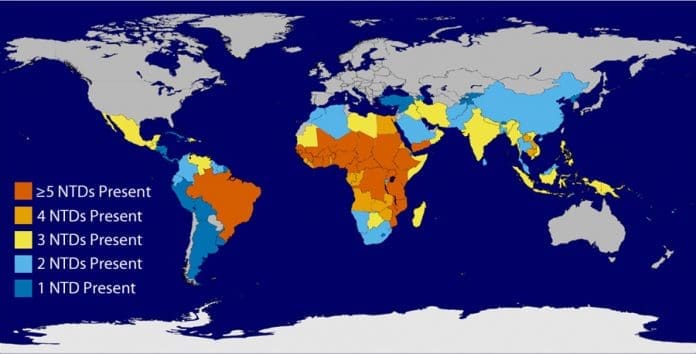Tanzania has expanded mass drug administration in schools to combat neglected tropical diseases that affect hundreds of millions across Africa, showing measurable improvements in student health and attendance.
The country’s integrated approach targets five priority diseases including lymphatic filariasis, river blindness, schistosomiasis, intestinal worms and trachoma through coordinated treatment campaigns. School-based distribution has proven particularly effective for reaching children who face the highest infection risks.
Faraja Lyamuya, focal person for Tanzania’s NTD Control Programme, reports significant progress in reducing parasitic infections among students. Previously common intestinal worm cases have declined substantially, with teachers noting improved classroom alertness and participation.
At Vikuruti Primary School in Kibaha district, Principal Magungu Beno documented a drop in absenteeism from 10 percent to much lower levels following drug administration programs. Parent education about treatment benefits has increased participation rates across affected communities.
The World Health Organization identifies Africa as endemic for 20 of 21 priority neglected tropical diseases, affecting over 565 million people who comprise 35 percent of the global disease burden. These conditions cause physical impairments, malnutrition, chronic pain and social stigma while perpetuating poverty cycles.
Tanzania faces endemic transmission of more than 15 neglected tropical diseases, prompting the 2009 launch of its integrated control program. The approach replaced separate disease-specific interventions with coordinated treatment strategies that maximize resource efficiency.
Gerald Ogodo from Uniting to Combat Neglected Tropical Diseases highlights Tanzania’s leadership in domestic resource mobilization as international funding declines. The country has met co-financing targets while contributing $1.5 million to the World Bank’s IDA 21 initiative supporting the world’s poorest nations.
Tanzania recently launched a comprehensive domestic resource mobilization strategy for neglected tropical diseases, providing a model for other African countries facing similar funding challenges. The approach integrates health interventions with education programs to optimize limited resources.
Peter Kivumbi from Sightsavers Tanzania notes the country’s pioneering documentation of geographical coverage and house-to-house treatment approaches. This systematic recording of elimination strategies offers valuable lessons for continental disease control efforts.
Several African nations have achieved elimination milestones despite resource constraints. Togo has eliminated four neglected tropical diseases while Ghana has successfully eliminated three, demonstrating that progress remains possible with sustained commitment.
Economic projections underscore the financial benefits of disease elimination programs. Nigeria could gain $19 billion in productivity by 2030, while Ethiopia, Kenya and Rwanda stand to secure $5 billion each through targeted elimination of just two diseases.
The mass drug administration strategy focuses on preventive chemotherapy delivered through existing health systems and community networks. This approach reduces treatment costs while ensuring consistent coverage in remote areas where diseases typically flourish.
Tanzania’s experience demonstrates that African countries can maintain health program momentum despite declining donor support. The shift toward domestic financing reflects growing recognition that disease elimination generates substantial economic returns on investment.
International partnerships continue supporting African disease control efforts through technical assistance and funding mechanisms like the Last Smart Fund launched by the Mohammed Bin Zayed Foundation with Gates Foundation backing.
The success of school-based programs reflects broader integration of health interventions with education systems across the continent. This coordination maximizes impact while building sustainable delivery mechanisms for ongoing disease surveillance.
Source: newsghana.com.gh











